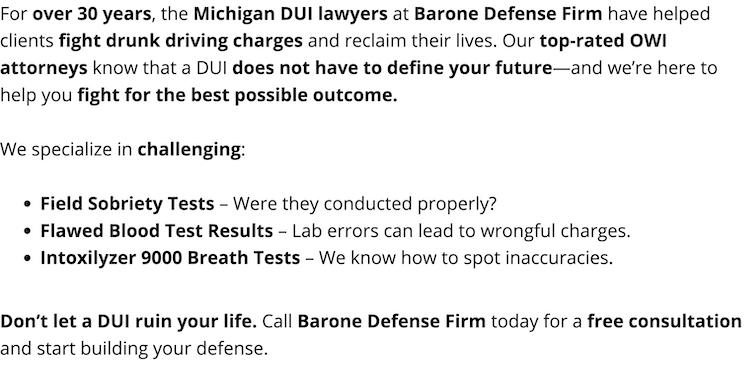DUI Criminal Prosecution
In Michigan, a first drunk driving (OWI, DUI, DWI) offense is a "93-day" Misdemeanor with a range of punishment. This will usually include a period of probation (six months to a year), and some number of community service hours (usually in the area of 20 – 50 hours, but this varies considerably from court to court). You will also be required to attend some form of alcohol education treatment or therapy. There are of course fines and costs, and the statute allows fines of $100.00 to $500.00 for a first offense OWI. Not all first offenders go to jail, but depending on the court, jail time for a first offense is also not entirely uncommon.
The Criminal Court Process
There are typically several court appearances in a drunk driving case, and the hearings are discussed elsewhere in more detail. Please understand that you WILL NOT GO TO TRIAL on your first court appearance. These first hearings are to determine whether or not you have hired an attorney or if you meet certain criteria that afford you the opportunity to receive a court-appointed attorney for your case.
If you have hired a lawyer, these court settings will provide an opportunity for investigation into the facts of your case, and explore ways to reach a final resolution without a trial. At each hearing, the official court file, the prosecutor and his or her file and your attorney are all present.
The Prosecutor's Role in Your Case
The Constitutional role of a prosecutor is NOT to obtain a conviction, but instead, is to ensure that justice is done. Prosecutors differ on exactly what this means, however, and wrongly believe that the words "justice" and "conviction" are synonymous.
AT the first court hearing, prosecutors and defense attorneys meet and discuss the case. The prosecution is required to share certain information with the defense counsel. This is called "discovery" and includes such things as the arresting officer's narrative report, any videotapes that may exist, and the maintenance records for the breath test machine (in Michigan called a DataMaster). In Michigan, there is also what is called "reciprocal discovery", meaning that your attorney is required to share any information he or she has about the case with the prosecuting attorney.
Severity of Prosecution
There is a lot of funding that goes into fighting out drunk driving cases and a lot of support from the community, especially groups like MADD, to eliminate them. Statistically, drunk driving is one of the largest groups of preventable deaths in the United States and many people are striving to prevent any more deaths from drunk driving.
How a Defense Attorney's Role is Different
A defense attorney's Constitutional role is to ensure due process of law. What this essentially means is that a defense attorney must make sure to protect the accused from being wrongfully convicted. This means the attorney must use all of his or her skill, knowledge and ability to be sure that the drunk driving accused is given all of his or her Constitutional and statutory protections.
So, to protect your due process rights, your attorney should carefully review all documents in the court's file as they may prove deficient in what is required to formally charge you with a crime. Some deficiencies can even result in the complete dismissal of all charges against you, but as you might expect, this is not common.
Your attorney should also review all documents which the prosecution may use at trial in their attempts to prove you guilty. Detailed notes should be taken and shared with you about the facts of your case. Copies of any and all videotapes should also request prior to or at these hearings. Michigan law mandates that you be provided with a true copy of any and all recorded statements of you either audio or video. This information, together with the information supplied by you to your attorney, will be the basis on which you decide how to best dispose of your case. At these hearings, your attorney should also investigate the possible punishments that might be imposed by the court in the event you decide to plead guilty, and also explore if these punishments would be any different if you were to lose at trial.
Conclusion
Once all of this information has been gathered, it should be provided to you. You should also have an opportunity to meet with your attorney, discuss all the facts of your case and the options available to you for disposition. This should include a discussion of plea options (plea bargaining) and a frank discussion of the possibility of winning at trial.
 Barone Defense Firm Home
Barone Defense Firm Home
















